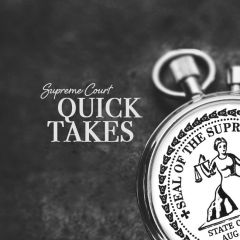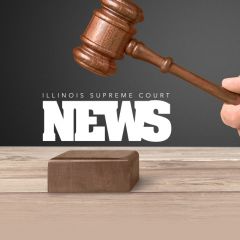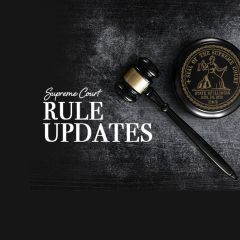As rewarding as it sometimes is, working with traumatized clients also can be difficult: A client’s trauma can undermine the client’s own goals for representation. And sharing the burden of a client’s trauma can wear on the attorney. But by understanding the nature of trauma, how it’s expressed, and how to respond to it, lawyers can anticipate and prepare for its unpredictable effects. The Illinois Bar Journal’s March 2020 cover article, “The Traumatized Client,” examines what may be taking place in the minds of traumatized clients and introduces several strategies attorneys can use to help the client work through the trauma and focus on the case.
Practice News
-
March 2, 2020 | Practice News

-
February 24, 2020 |
Practice News
PILI seeks a managing attorney, who will serve as a member of PILI’s Programs Team, with primary responsibility for managing PILI’s statewide efforts to expand and enhance pro bono. This is a dynamic position that requires both the ability to organize and coordinate at a high level, while also being actively engaged in administration and implementation. The ability to do regular and significant statewide travel, and limited national travel, is required.
-
February 24, 2020 | Practice News

Defaulted defendants frequently seek relief from default orders and judgments in the form of motions to vacate brought under 735 ILCS 5/2-1301 or 2-1401. As they say, timing is everything. The availability of relief from an order or judgment to which a defaulted party may be entitled and the standard the court must apply in determining whether a party is entitled to the relief he or she seeks depend almost exclusively on the timing of the request. Moreover, because of the procedural uniqueness of the Illinois Mortgage Foreclosure Law (IMFL), found in Article XV of the Illinois Code of Civil Procedure, an understanding of the interplay between the IMFL and the Article II civil practice statutes is critical for a successful litigant. In her February 2020 Illinois Bar Journal article, “Mortgage Foreclosure Relief,” Cook County Circuit Court Judge Cecilia Horan examines possible relief from default orders and judgments available in mortgage foreclosure cases and the limitations on those remedies.
-
February 21, 2020 | Practice News

The Illinois Supreme Court handed down two opinions on Friday, February 21. In People v. Gayden, the court considered whether to provide a means for a defendant to challenge his trial attorney’s failure to file a motion to suppress where the record on direct appeal was found to be insufficient to evaluate that claim. In Joiner v. SVM Management, LLC, the court reaffirmed its prior holdings that a class action lawsuit is mooted when the named plaintiff rejects tender of full relief before a class certification motion is filed.
-
February 18, 2020 | Practice News

Every personal injury lawyer has handled a motor-vehicle case. When photographs exist showing damage (or the lack thereof) to the vehicles involved in a collision, the parties will invariably try to admit the photos into evidence to support their theory of the case. If the photos show substantial damage, the plaintiff will seek to admit them to argue that the impact between the vehicles was significant, and that the force of the impact caused more serious injuries. Conversely, if the photos show little or no damage, the defendant will seek to admit the photos to suggest that the impact was minimal, and that the plaintiff was therefore not likely injured to the extent claimed. But what does all this mean now, in light of Peach v. McGovern, in which the Illinois Supreme Court recently held that in personal injury cases, expert testimony is not required to admit postaccident photographs of vehicles involved in a collision? In his February 2020 Illinois Bar Journal article, “A Picture is Worth a Thousand Words,” Arlo Walsman examines this development in caselaw.
-
February 13, 2020 |
Practice News
Attorney Kathryn H. Mickelson provides an overview of prenuptial agreements.
-
February 11, 2020 | Practice News

The Illinois Supreme Court today announced a pilot program utilizing volunteer pro bono attorneys to reduce the backlog of criminal appeals that are currently pending with the Office of the State Appellate Defender (OSAD) across the state.
In this six-month pilot program, pro bono attorneys will help reduce the backlog by substituting for OSAD in certain criminal appeals. The pilot program will launch in the First and Second Districts of the Appellate Court with managerial assistance from the Administrative Office of the Illinois Courts. Upon favorable assessment of the pilot program, it would be expanded to include the Third, Fourth and Fifth District Appellate Courts.
-
February 10, 2020 | Practice News

Conflicting federal and state laws pose many interesting legal questions for Illinois and other states that have legalized recreational cannabis. In his February 2020 Illinois Bar Journal article, “Major Buzzkill,” Joe Schomberg examines one often-overlooked issue: the availability of the U.S. Bankruptcy Code to businesses engaged in, or adjacent to, the bourgeoning legalized cannabis industry. Schomberg’s article received first place in the Illinois Bar Journal’s 2020 Lincoln Award Legal Writing Contest.
-
February 10, 2020 | Practice News

Illinois Supreme Court Justice Robert R. Thomas has announced his retirement from the Illinois Supreme Court effective Feb. 29, 2020.
Justice Thomas, 67, became the first Chief Justice from DuPage County when he was elected to that post from 2005-2008. One of the major accomplishments during Justice Thomas’ tenure as Chief was the establishment of the Supreme Court Commission on Professionalism, an outgrowth of the Special Supreme Court Committee on Civility, which was formed in 2001.
-
February 7, 2020 | Practice News

The Illinois Supreme Court has amended several Rules pertaining to bail and bond, effective March 1.
The Supreme Court on Feb. 6 announced that it has amended Rules 501, 526, and 528.

